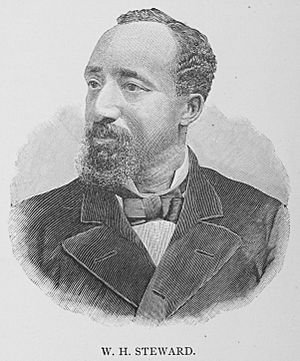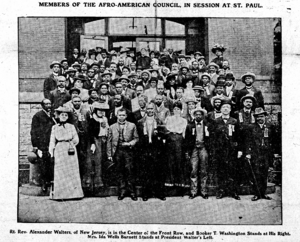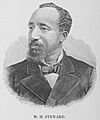William Henry Steward facts for kids
Quick facts for kids
William Henry Steward
|
|
|---|---|

Steward in 1887
|
|
| Born | July 26, 1847 |
| Died | January 3, 1935 (aged 87) |
| Alma mater | Shaw University |
| Occupation | Educator, journalist |
| Political party | Republican |
William Henry Steward (born July 26, 1847 – died January 3, 1935) was an important civil rights activist from Louisville, Kentucky. In 1876, he became the first Black letter carrier in Kentucky.
He was a key leader in the General Association of Negro Baptists in Kentucky. He helped found Simmons College of Kentucky in 1879. Steward continued to support the college throughout his life.
He also co-founded the American Baptist newspaper and later became its editor. Steward was a community leader in Louisville. He worked hard to create more educational chances for Black children in the city.
In 1897, he was appointed as a judge overseeing voter registration. This was the first time an African American held such a position in Kentucky. He was also elected president of the Afro-American Press Association in the 1899s.
Steward worked closely with Booker T. Washington. He was a major member of the National Afro-American Council in the late 1890s and early 1900s. He served as the council's president from 1904 to 1905.
He always fought against segregation, which meant keeping people of different races separate. He often worked against Jim Crow laws, which enforced segregation. In 1914, he helped start a Louisville branch of the National Association for the Advancement of Colored People (NAACP). He later joined the Commission on Interracial Cooperation (CIC). Steward was also a prominent Freemason and was twice elected to a high leadership role in the Grand Lodge of Kentucky.
Contents
Early Life and Education
William Henry Steward was born into slavery on July 26, 1847, in Brandenburg, Kentucky. When he was nine, his owner brought him to Louisville, Kentucky. He was allowed to go to school.
He attended schools taught by important educators like Henry Adams and William H. Gibson. These schools were run by the First African Baptist Church. As a young man, he taught in schools in Frankfort and Louisville. He taught at the Eastern Colored School for three years.
An uncle helped him get a job as a laborer for the Louisville and Nashville Railroad. He was later promoted to a messenger role in 1875. In 1867, he became a member of the Baptist Church. He was very active, leading the choir and teaching Sunday School at the Fifth Street Baptist Church in Louisville.
Early Career and Community Work
In February 1876, Steward left the railroad. He became a letter carrier in the Louisville post office. This made him the first Black letter carrier in Kentucky. He was well-respected in this job. In 1882, he was chosen to represent Kentucky at the National Letter-Carrier's Association meeting in Philadelphia.
Steward was often involved in religious and community meetings. He served as secretary for several Baptist conventions. He also helped found the Louisville Orphans' Home in 1877 and was on its board of directors.
In 1879, Steward was a key leader in the General Association of Negro Baptists in Kentucky. He played a big part in starting Simmons College of Kentucky. The college first opened on November 25, 1879. Steward chose the land for the school in Louisville. For most of his life, he was the chairman of the board of trustees at Simmons College. He also taught music there.
Also in 1879, Steward and the General Association started the American Baptist newspaper. Steward was involved with the paper from the beginning. He worked as a city editor, associate editor, and then as the editor and business manager.
In 1881, Steward joined the Masonic Fraternity. He earned great respect within the group. He held several high positions, including being elected Worshipful Master of the Grand Lodge of Kentucky twice. He also supported public schools in Louisville. He worked to help them grow and develop. He especially helped Black teachers get appointed to jobs. He was also a strong supporter of a Black YMCA that started in Louisville in 1892.
Steward was a strong supporter of the Republican Party. He believed the Democratic Party was responsible for Jim Crow laws. He felt they opposed the 13th, 14th, and 15th Amendments. These amendments increased civil rights for African Americans. In 1897, his support helped the Republican Party win local elections. Steward was then appointed as a judge overseeing voter registration. This was a historic first for an African American in Kentucky.
National Influence and Civil Rights
Steward's work with the American Baptist newspaper made him known across the country. He was elected secretary of the National Baptist convention in 1886. He continued to hold leadership roles at many later conventions. In 1892, he was a delegate to the 1892 Republican National Convention.
In the 1890s, he was elected president of the national Afro-American Press Association. As president, Steward actively supported William McKinley for president in 1896.
As a community leader, Steward was always involved in race relations. He often used moderate methods. He aimed to advance the interests of African Americans while still working with white supporters. He became associated with Booker T. Washington early on. Like Washington, he believed in racial self-help and working with white people. He often worked behind the scenes. For example, in 1904, he worked with Washington to oppose a bill in Kentucky that would have taken away voting rights from Black people.
In the late 1890s and early 1900s, Steward was a key member of the National Afro-American Council. He was president of the council from 1904 to 1905. This council was led by Booker T. Washington. It included other important leaders like W. E. B. Du Bois and anti-lynching activist Ida B. Wells.
Later Life and Legacy
In 1906, Steward and other Black leaders in Louisville started the Cave Dwellers Life Association. This was a life insurance company. In 1910, Steward met with white officials about protests against Jim Crow streetcar rules. His efforts helped prevent a ban on Black people from streetcars.
In 1914, Steward helped found a Louisville branch of the NAACP. This continued his work against segregation and for education. In 1917, Steward worked with the NAACP on a lawsuit. This case went to the U.S. Supreme Court. The court overturned Louisville's Residential Segregation Ordinance.
In 1920, Steward left the NAACP. He became a key player in the Commission on Interracial Cooperation (CIC). This group worked for similar goals. However, they sometimes disagreed with the NAACP. For example, when Louisville banned Black people from public parks in 1924, the NAACP spoke out against it. The CIC, however, praised the mayor for opening a new park with a swimming pool in a Black neighborhood.
Later in his life, Shaw University gave Steward an honorary Master of Arts degree. In 1917, Alabama A&M University awarded him an LL. D. degree, which is a doctor of laws degree.
William Henry Steward died on January 3, 1935, in Louisville. His funeral was held at Fifth Street Baptist Church. He was buried next to his wife, Mamie E. Lee Steward, in Louisville's Eastern Cemetery. In 1935, the University of Louisville acquired a building from Simmons University. They named it Steward Hall in his honor.
Images for kids
 | Frances Mary Albrier |
 | Whitney Young |
 | Muhammad Ali |




